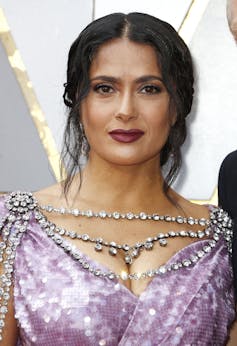#MeToo and #TimesUp move off the red carpet and towards activism at 2018 Oscars
- Written by Michelle Smith, Senior Lecturer in Literary Studies, Monash University
The Oscars telecast is typically a traditional affair: passionate speeches played out by the orchestra, hit-or-miss opening monologues, and the certainty of being overly long. This year’s ceremony brought with it potential challenges to convention. In light of the #MeToo and #Times Up movements against sexual harassment, it was unclear who would be welcome at the ceremony, what women would wear on the red carpet, and what truth bombs might be dropped in acceptance speeches.
Tarana Burke, the civil rights activist who first politicised the phrase “Me Too”, explained that the expulsion of Oscar-fixture Harvey Weinstein from the academy was a welcome relief for actresses who had needed to “pretend” in his presence at previous awards. James Franco, whose sexual assault allegations (which he has denied or disputed) may have derailed his Oscar hopes, was not in attendance either. His absence, despite his highly successful film The Disaster Artist and Golden Globes victory, is a clear signal that Hollywood will no longer overlook allegations of abuse of power and status.
However, with a sexual misconduct accusation from a former employee levelled against him (which he denies), the decision to permit Ryan Seacrest to conduct red-carpet interviews for E! News showed that a history of ignoring potentially questionable behaviour by luminaries such as Woody Allen and Roman Polanski has not been entirely overcome.
At the Golden Globes this year, women showed their solidarity with victims of sexual harassment and assault by dressing in black. Eight actresses, including Emma Watson, walked with activists who tackle issues of sexual harassment and gender inequality. At the Grammy Awards, musicians including Lady Gaga and Cyndi Lauper wore white clothing or white roses.
As the presence of activists at the Golden Globes suggested, the movement needed to move beyond symbolic clothing gestures to enact real change. Time’s Up was not represented on the Oscars red carpet through black clothing. Filmmaker Ava DuVernay suggests this was because the cause is “not about the red carpet”, but about “being activists”.
The Time’s Up movement may have been sparked by 300 privileged women in the entertainment industry, but it has also come to encompass the universal struggle of women to avoid assault and harassment at work. A letter from the Alianza Nacional de Campesinas (National Farmworker Women’s Alliance) addressed to the founders of the movement spoke to how these issues affected more than 700,000 women who have little power and no public profile. Since then, Time’s Up has raised more than $21 million to enable women in less fortunate occupations to pursue workplace harassment cases.
The broadening of Time’s Up to encompass a wider range of marginalised people was evident in the dedicated Oscars segment introduced by three of Weinstein’s alleged victims, Salma Hayek, Ashley Judd and Annabella Sciorra. Hayek offered a tribute to “the unstoppable spirits who kicked ass and broke through the biased perceptions against their gender, their race, their ethnicity to tell their stories”.
 Salma Hayek at the 2018 Oscars.
MIKE NELSON
Salma Hayek at the 2018 Oscars.
MIKE NELSON
The montage that followed featured writers, directors, producers and actors advocating for diverse stories on film, strengthening the call to reduce the white male stranglehold on the industry. Oscar-nominated writer and Pakistani-American Kumail Nanjiani suggested we must ignore the view that only stories about white men are of relevance to audiences: “Some of my favourite movies are movies by straight white dudes about straight white dudes. Now straight white dudes can watch movies starring me and you relate to that. It’s not that hard. I’ve done it my whole life.”
In contrast to the Golden Globes, in which men largely remained silent — perhaps in a wise decision to allow women to speak for themselves — Oscars host Jimmy Kimmel could not ignore the removal of Weinstein from the Academy. Kimmel acknowledged that the film industry was a test case for ending sexual harassment in all workplaces. In a testament to the far-reaching effects of gender inequality, he joked: “If we can do that, women will only have to deal with harassment all the time at every other place they go.”
Best actress winner Frances McDormand used her victory to celebrate all women in the film industry. While the women in the audience stood to applause, she encouraged industry players to support them in the creative projects they wished to pursue. The glaring fact remains that only one woman has ever been awarded the best director honour at the Oscars.
The 90-year history of the Academy Awards shows enduring beliefs that women’s stories are less significant and lack commercial potential. It also underscores the idea that women are incapable of making these stories into motion pictures either.
Undoubtedly, this diminishing of women’s experiences and capability feeds into perceptions that they are mere accessories useful for their sexual appeal. In the motion picture industry, it might just take changing films to change reality too.
Authors: Michelle Smith, Senior Lecturer in Literary Studies, Monash University





